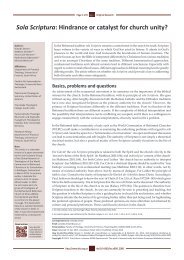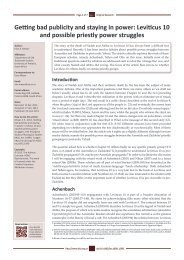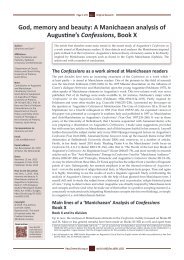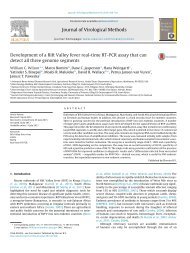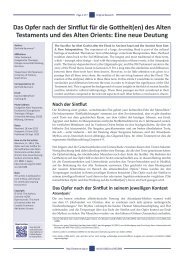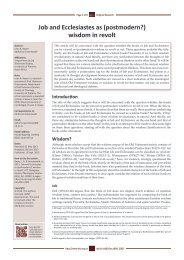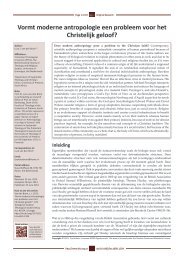Icon - Verbum et Ecclesia
Icon - Verbum et Ecclesia
Icon - Verbum et Ecclesia
You also want an ePaper? Increase the reach of your titles
YUMPU automatically turns print PDFs into web optimized ePapers that Google loves.
Page 4 of 7<br />
Original Research<br />
word sk<strong>et</strong>ches a consistent picture: God is the one who acts.<br />
Just as Israel received God’s instruction at Sinai, the nations<br />
will be taught and instructed at Mount Zion through the<br />
Book of Isaiah (Berges 2001:59).<br />
Once Zion is restored, Torah will go forth from her to the<br />
nations. Here for the first time she plays a role regarding the<br />
nations. The expression יצא [to go forth] reminds one of the<br />
temple vision in Ezekiel 47, where יצא is constantly used to<br />
describe the flowing, life-assuring waters from the altar of<br />
the temple (Berges 2001:59). Consequently, Isaiah 2:3 could<br />
be translated as follows: ‘for out of Zion flows forth the<br />
Torah’ as lifegiving force. Here by the waters of the Torah<br />
the just can plant their roots and yield fruits in its season<br />
(Ps 1; Jr 17:8). It seems to be no coincidence that the song of<br />
thanksgiving in Isaiah 12, at the very end of the first main<br />
section of the book, also refers to water in relation to Zion<br />
and the nations (Is 12:3, 6).<br />
Furthermore, the expression ‘out of Zion flows forth Torah’<br />
(Is 2:3) should be seen in connection with the mission of the<br />
Ebed [Servant] to bring forth justice to the nations (42:1). Zion<br />
and the Ebed fulfil a similar task, not only in their suffering,<br />
but also in their mission to the nations. The difference is,<br />
however, that the Ebed has to bring justice to the people,<br />
whereas Zion will receive the nations who will come to her<br />
(Williamson [1994] 2005:152).<br />
The function of the new temple centres on Torah. 13 Jerusalem<br />
will be known primarily for the temple where Yahweh<br />
abides, and this temple is to serve as a gathering place for<br />
learning Yahweh’s ways and paths (Watts 2005:48). Parallel<br />
to the Torah of the pilgrimage of the nations, we find the<br />
‘word of Yahweh’ that now goes forth from Jerusalem<br />
(Lohfink 1994:40).<br />
The word about the pilgrimage of the nations begins with<br />
the symbolic picturing of mountains and hills (v. 2). Next to<br />
Zion there are only hills, which do not match its height. The<br />
world landscape changes as Zion becomes the highest of the<br />
mountains. 14 If in this context the word Torah is so clearly<br />
emphasised, that suggests that the Torah that is directed to<br />
the nations from Jerusalem is connected with that peaceestablishing<br />
Torah possessed by Israel that lives on Zion<br />
(Lohfink 1994:42).<br />
Verse 4<br />
With this verse we finally reach the specific goal of the<br />
nations’ quest, namely that God should ‘judge b<strong>et</strong>ween’<br />
and ‘arbitrate’ for them. Yahweh will decide on the issues<br />
that are concerning the peoples (Watts 2005:48; Williamson<br />
13.Regarding the function of Zion and the temple Beuken (2003:92) postulates as<br />
follows: ‘Die Völkerwallfahrt soll dazu führen, dass sie ihre durch Gott festgelegte<br />
Rolle auch tatsächlich einnimmt. Von ihr aus soll eine Bewegung zu den Völkern<br />
in Gang kommen: Sie ist dazu bestimmt, Ausgangspunkt für JHWHs Tora zu sein.’<br />
14.With regard to election of Zion as the mountain of Yahweh Beuken (2003:91) infers<br />
as follows: ‘Zions heilsgeschichtliche Erwählung als Berg des Hauses JHWHs zieht<br />
eine geographische Verwandlung nach sich: Der Berg wird nicht nur hoch, sondern<br />
er wird der höchste der Berge sein. Das Thema spielt im Verlauf des Jesajabuches<br />
eine Rolle, wo »Berge/Hügel« den Widerstand gegen die göttliche Autorität<br />
symbolisieren, l<strong>et</strong>ztlich aber sein befreiendes Wirken an Israel anerkennen.’<br />
2006:185). A significant element of the role of the pre-exilic<br />
king was that he should exercise divinely given wisdom in<br />
the s<strong>et</strong>tling of disputes b<strong>et</strong>ween his subjects. By extension,<br />
cases of international dispute will be decided by the Great<br />
King, the God of Israel.<br />
The background of this oracle is in the legal tradition and<br />
it takes as an example the process of the High Court of<br />
Arbitration as described in the Deuteronomic Law. It<br />
offers conspicuous parallels to Deuteronomy 17:8–11;<br />
specifically with regard to the word pair ‘Torah’ or ’word’ in<br />
Deuteronomy 17:11. The scene described here is in essence<br />
the same, but in the proph<strong>et</strong>ic oracle it has moved from the<br />
private realm to the dimension of international relationships.<br />
Everyday legal practice and custom, as envisioned and<br />
legislated by the Deuteronomic code with its central abode<br />
for the Deity, is reflected and magnified to produce the<br />
proph<strong>et</strong>ic picture of the future of international relationships<br />
(Schwartz 1998:19–21). The nations will thus also experience<br />
the benefits of the Torah in the way Israel enjoys them. Was it<br />
not prophesied by Moses that the nations would envy Israel<br />
because of the Torah (Dt 4:5–8)? This, however, can only<br />
happen on the precondition that they protect the Torah in<br />
their hearts (Beuken 2003:93).<br />
This verse assumes the sovereignty of Yahweh over the<br />
nations and the peoples – a point that chapter 41 will develop<br />
further. As this text continues, it clearly presses forward<br />
to questions of human conflict. The consequences of the<br />
nations’ implementation of God’s decisions are spelt out<br />
in terms of a utopian vision of peace. It is presented as the<br />
natural consequence of the nations seeking, receiving and<br />
acting upon God’s instruction and arbitration. 15 As one reads<br />
further, the surpassing height of Zion seems have som<strong>et</strong>hing<br />
to do with the peace that the nations are unable to find<br />
amongst themselves, but which they seek and then obtain<br />
from Zion (Lohfink 1994:42).<br />
The functions that Yahweh has performed in his relationship<br />
with Israel will now be applied universally. Armaments<br />
and wars will be unnecessary as his decisions will s<strong>et</strong>tle all<br />
disputes b<strong>et</strong>ween peoples and nations. Wars will therefore<br />
cease. When the population of the countryside is called to<br />
arms, as evidenced in Joel 4:9–10 (Eng. 3:9–10), they are told<br />
to ‘beat your ploughshares into swords, and your pruning<br />
knives into spears’ (Williamson 2006:186). In Isaiah’s vision,<br />
the belligerent peoples will reverse this process, and turn their<br />
implements of warfare back into implements of agriculture,<br />
as they were originally (Schwartz 1998:17). Nations will no<br />
longer lift up a sword against each other, and they will not<br />
learn to fight any more.<br />
Verse 5<br />
It has already been remarked that verse 5 was formed with<br />
verse 3 as a model (Sweeney 1988:135). The expression<br />
‘come, and l<strong>et</strong> us walk’ is undoubtedly modelled on the<br />
similar ‘come, l<strong>et</strong> us go up’ in verse 3. This summons makes<br />
15.Beuken (2003:93) formulates this assumption as follows: ‘Die Initiative zum<br />
Frieden geht als Frucht von JHWHs Tora bei den Völkern von diesen selbst aus.’<br />
http://www.ve.org.za<br />
doi:10.4102/ve.v34i2.866


